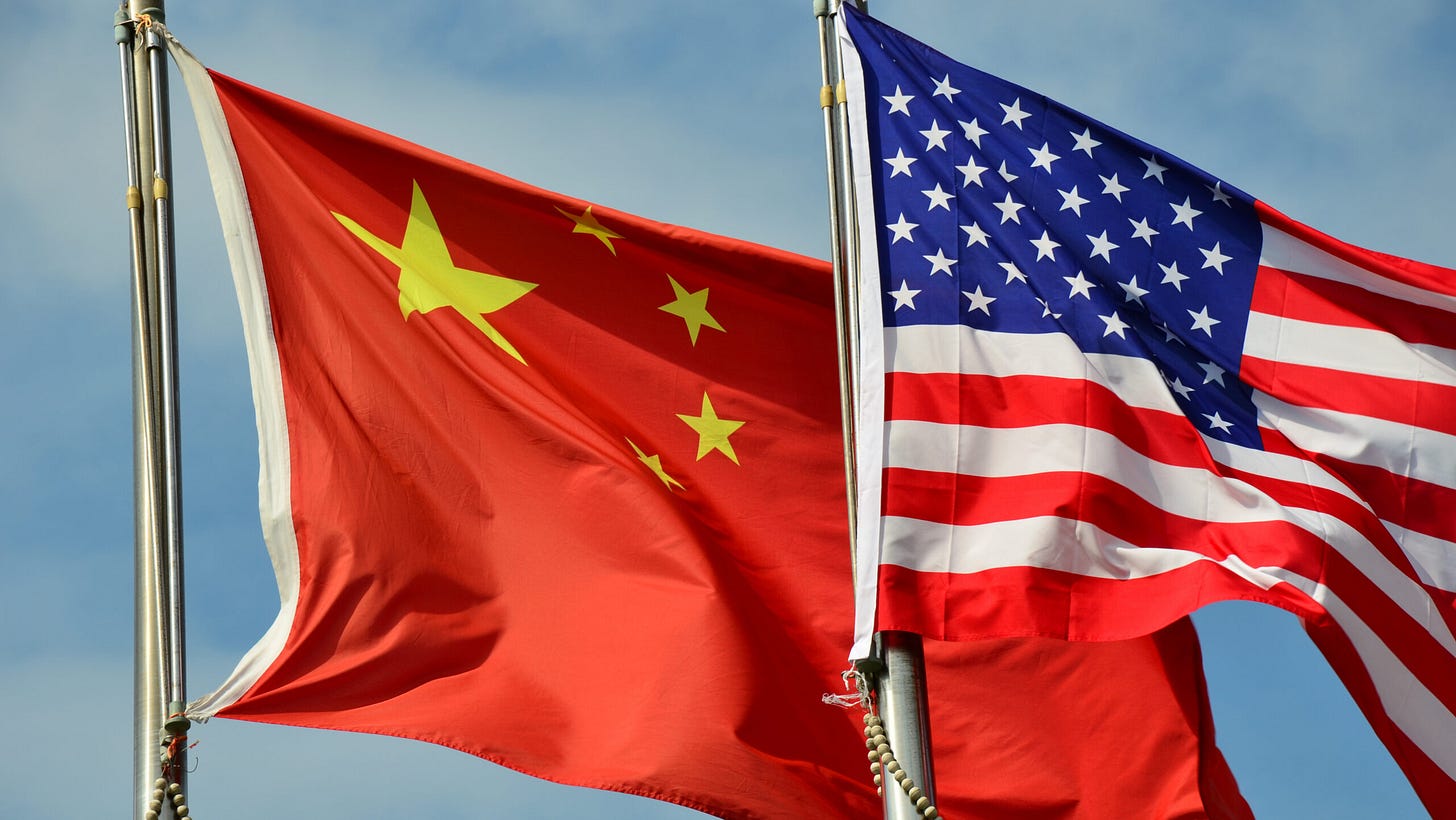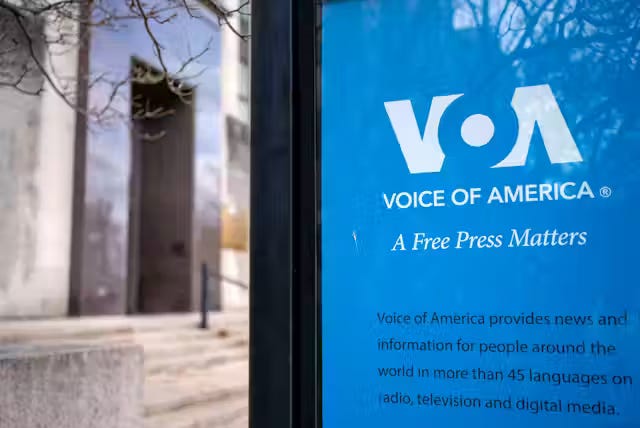“Like a Landlord Seeking Rent”
America was once seen as a force for moral legitimacy. The world thinks that has changed.
Within weeks of taking office, the Trump administration has effectively gutted America's soft power apparatus, creating a power vacuum that is now being filled by China.
The imagery couldn't be more stark: As President Trump dismantled USAID, Chinese medical teams were checking household water conditions in African villages. While the US suspended $60 billion in foreign aid programs, Beijing inaugurated school improvement projects in Cambodia. As Washington withdrew from the Paris Climate Agreement, Chinese engineers were installing solar panels across the Pacific islands. And as Trump shuttered Voice of America broadcasts, China Radio International expanded into new markets.
These contrasting scenes tell the story of a profound geopolitical realignment unfolding before our eyes.
As we detailed last week, the dismantling of USAID and US global health programs has created immediate openings for Chinese influence. And China is swooping in, immediately assuming funding for high-profile projects that the United States has abandoned.
"The loss of trust in America creates a vacuum, and that vacuum is likely to be filled by cooperation between Moscow, Beijing, Pyongyang and Iran," warns James Bindenagel, professor emeritus at the University of Bonn and former senior US diplomat who served extensively in Germany.
As the South China Morning Post, which is independently owned but reflects the opinion of the Chinese government, explicitly highlighted in a recent article titled, “Can China fill US-sized void in Pacific after Trump's foreign aid freeze?”, Beijing is strategically positioning itself to replace American influence.
The article notes that, "China is expected to fill the void that’s been left behind by US President Donald Trump’s halt on foreign aid in the Pacific region, with Beijing set to grow its influence in economic and climate adaptation projects in particular.”
Information battlefield
Perhaps nowhere is America's retreat more visible than in the information sphere. The targeting of US government-funded international broadcasters like Voice of America, Radio Free Europe, and Radio Free Asia – has silenced crucial independent voices in regions dominated by state-controlled media.
These organizations were established during pivotal moments in American foreign policy. Voice of America during World War II to counter Nazi propaganda, Radio Free Europe during the Cold War, and Radio Free Asia in 1996 to reach authoritarian states in Asia. They have been vital counterweights to government censorship in those regions.
Trump's executive order to pare down the nearly $1 billion US Agency for Global Media resulted in hundreds of journalists being swiftly put on leave or fired. The impact is particularly devastating for Radio Free Asia, which broadcasts in Mandarin, Cantonese, Uyghur, Tibetan, and seven other languages across a region where freedom of the press is severely restricted.
RFA's reporting on China's detention of more than one million Uyghur Muslims in Xinjiang had been a vital source of information on human rights abuses that Beijing has worked relentlessly to suppress.
"You have only to look at the way dictators in the region are celebrating our defunding," said Bay Fang, president of Radio Free Asia. "We provide a voice that counters their propaganda and shines a light into dark corners they'd rather leave untouched.”
The Global Times, a mouthpiece of the Chinese Communist Party, couldn't contain its glee, writing in an editorial that "the so-called beacon of freedom, VOA, has now been discarded by its own government like a dirty rag."
Without these broadcasts reaching an estimated 360 million people weekly in almost 50 languages, Beijing's stance on Taiwan, human rights abuses, the origins of coronavirus, and Chinese military aggression in the South China Sea will go largely unchallenged in many parts of Asia. For decades, Chinese listeners secretly tuned in to Voice of America for news that was censored at home – coverage that included accurate reporting on natural disasters, crackdowns on pro-democracy protesters, and cultural programs that helped shape a generation of intellectuals.
For China, which has spent years jamming radio transmissions and restricting access to these American broadcasters, this represents a significant victory in the battle for narrative control, one that comes at precisely the moment when China is most aggressively expanding the reach of its own state-funded media worldwide.
Unilateral disarmament
What makes this shift so puzzling is that it appears self-inflicted. While announcing a next-generation fighter jet aimed at containing China's dominance in the Pacific skies, the United States is systematically dismantling the very agencies that gave America its global edge. Agencies like the Office of Net Assessment, an internal think tank at the Pentagon that looks 20 to 30 years into the military's future, which was credited with helping to win the Cold War, and groups like the cybersecurity boards investigating Chinese infiltration of American telecommunications networks.
For European allies, Trump's pivot away from established norms has created an existential crisis. After the president appeared to side with Russia over Ukraine and threatened NATO members with new tariffs, Friedrich Merz, the presumptive next German chancellor, delivered a blunt assessment in a televised roundtable: "It is clear that the Americans, at least this administration, are largely indifferent to the fate of Europe."
As the United States alienates Europe, China is making tangible moves to fill the void. Chinese companies are rushing to establish factories across the continent, with automotive giants Volkswagen, Renault, and Stellantis now integrating Chinese manufacturing expertise for affordable EVs. In renewable energy, Chinese wind turbine manufacturers have entered European markets offering prices up to 50% lower than local competitors. Diplomatically, Beijing has positioned itself as a potential mediator in Ukraine, explicitly calling for European involvement in negotiations – a stark contrast to Washington's unilateral approach.
With European economies already stagnating and further threatened by the promised 25% tariffs, China sees another open door. Despite concerns about Chinese human rights abuses, Beijing is positioning itself as a more reliable partner than an increasingly unpredictable Washington – offering both its vast market and potential diplomatic leverage in conflicts like Ukraine that Europeans cannot easily ignore.
China's calculated response
This diplomatic positioning reflects China's broader global approach. While the U.S. creates chaos through abrupt withdrawals and policy reversals, Beijing presents itself as the adult in the room. In public remarks at the recent Association of Southeast Asian Nations (ASEAN) summit – a regional bloc of ten countries with a combined economy of $3.3 trillion – Chinese Foreign Affairs Minister Wang Yi used the word "stability" at least 14 times in a 90-minute address, according to Chinese transcripts – a deliberate contrast to the upheaval unleashed by Washington's retreat from its traditional leadership role.
China is also positioning itself as a champion of climate stability and renewable energy technology to compensate for America's retreat. Trump's withdrawal from the Paris Agreement and his decision to ban U.S. officials from attending the recent Intergovernmental Panel on Climate Change (IPCC) meeting in Hangzhou created another significant void. The dismissal of hundreds of climate experts from the National Oceanic and Atmospheric Administration will impact global climate monitoring efforts at a critical moment.
As one Chinese editorial noted following the IPCC meeting: "Trump's feckless climate policies must not be allowed to derail global efforts to fight global warming. Luckily, there is a strong case for other major powers to step in and fill in the gaps created by Trump's decisions."
But despite positioning itself as a climate champion, China's actions present a more complicated picture. While Beijing dominates global manufacturing of solar panels and wind turbines, it simultaneously remains the world's largest carbon emitter. Its climate diplomacy offers the veneer of global leadership, but the gap between Beijing's climate rhetoric and reality suggests a strategy focused more on filling America's diplomatic void than addressing the climate crisis itself.
New global reality
What's emerging is a fundamental reshaping of the international order.
This shift isn't just about dollars and cents – it's about whose vision shapes the future.
Singaporean Defense Minister Ng Eng Hen summarized the transformation in a roundtable at the Munich Security Conference in Europe last month with brutal clarity, noting that America had once been seen as a force for "moral legitimacy" and was now looking like "a landlord seeking rent."
Meanwhile, Chinese Premier Li Qiang signaled the opposite approach, at a recent symposium in Beijing: "China is ready to work with other members of the international community to promote an equal and orderly multipolar world."
America's withdrawal has created a strategic vacuum that China appears increasingly willing and able to fill. For a world that has known stability largely under the American security umbrella since the end of World War II, these are profound challenges. The question is no longer whether America's retreat will create opportunities for China, but how quickly Beijing will seize them – and at what cost to the global order that has underpinned international stability for generations.









The demonization of expertise (anti-intellectualism) - whether medical, diplomatic, or otherwise - is how we got here. Certain media outlets would have us believe that all this international aid is from leftists throwing money around to further their liberal agenda - when reality it’s a calculated strategy by highly educated and informed experts to exert soft power, beginning in the Cold War era. The lack of intellectual humility on the right is alarming.
For my entire life it was always “China is going to take over everything” “in fifty years we’ll all be speaking mandarin” .. China has always been the communist boogeyman we have to stop from getting too powerful and now….. we cleared the path for them to do exactly what we have been trying to prevent ?
Yet again Trump has shown just how absolutely unfit he is to be president. He has the foresight of a toad and lacks the intellect to critically think about the long term consequences of his actions.